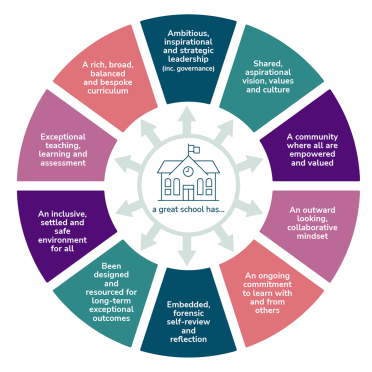The great school has a self-evaluating culture.
Collective and collaborative review - book looks, learning walks and observations of teaching - are habitually conducted by a wide range of staff. upils and stakeholders are routinely asked to feed into the development of the school and identify areas for improvement. Peer review and feedback are seen as an entitlement, used as an opportunity to increase the common wealth of intellectual curiosity, knowledge and expertise and ensure consistently high standards.
Leaders ensure that the education and business plans are integrated and embedded. They are flexible and responsive, they complement each other and are regularly reviewed for their joint maximum impact. There is a regular and forensic analysis of performance and business data. Discussion leads to the identification of strategies for improvement and effective interventions, the implementation of smart action plans and the securing of accountability. The school has an embedded culture for collective review of financial and business management linked to the school priorities. Leaders continuously strive to ensure best practice across all business functions of the school in order to achieve the highest quality of education.
The school practises appreciative enquiry by distinguishing the best of ‘what is’, fostering a dialogue around ‘what should be’ and creating a vision for ‘what will be’. There is a continuous process of reflection that becomes implicit in the way that everyone within the school community talks about their learning. Self-evaluation at all levels is grounded in sophisticated, accurate and open analysis and is used unflinchingly to compare performance against the most stretching of benchmarks. The school regularly seeks feedback from and takes full account of the views of students, parents and the community in evaluating its progress and meeting all the needs of its learners. It learns from its mistakes and accepts the challenge of continual improvement.
The great school makes good use of external critical friends - including peer schools - at key points in its journey to provide an open and rigorous reality check.
This lens will typically be reflected in:
- Monitoring review and evaluation systems and cycles
- Pupil case studies
- Performance analysis: attendance, behaviour, exclusions, progress, attainment
- Test and exams analysis and action planning
- Staff turnover records
- Strategic financial planning records
- Lesson observation/ learning walk/ book look records
- Quality standards: Early Years, wellbeing, Healthy School etc.
- Use of ideas/suggestions boxes
- Policy review systems
- Contract review systems
- Audits e.g. SCR, curriculum, finance, governance
- Self-evaluation of governance
- External reviews of governance
General documents, policies and procedures in which you might typically see the lenses reflected.
Resources
-
Summer 2021
Measure What Matters –John Doerr, 2018
Autumn 2019
Self-Improving Schools – the Journey to Excellence - Roy Blatchford and Rebecca Clark, 2016
The Intelligent School - Barbara MacGilchrist, Jane Reed et al, 2004
High Performers: The Secrets of Successful Schools - Alisdair Smith, 2011
Integrated curriculum financial planning tools and metrics
DfE Financial benchmarking and insights tool
A schools' guide to implementation - EEF
Better: A Surgeons Notes on Performance - Atul Gawande, 2008

Ways in which HFL can provide support
Joint Annual Review Visit (JARV) – Early Years and primary
Standards Visit (all phases)
Leadership and management reviews (all phases)
Pupil premium reviews (all phases)
Eliminating Economic Exclusion (EEE) Review
Safeguarding reviews (all phases)
Race equity reviews and audits
Early Years reviews and EEEYP; joint monitoring activities
Self-Evaluation of Governance, External Reviews of Governance and advice from the helpdesk on individual governor self-evaluation - Governance Services
Appraisal and performance management training – HR Services
Curriculum reviews
SEND audits and benchmarking – SEND team
PSHE, behaviour, mental health and SRE audits – Wellbeing team
Review of staffing structures – HR and Financial Services
Finance audits – Business Management Services
Data analysis and reports - Data Management Services
Please contact us for further information on 01438 544464 or email info@hfleducation.org
The Great School Framework is made up of:
Ambitious, inspirational and strategic leadership (inc. governance)
Shared, aspirational vision, values and culture
A community where all are empowered and valued
An outward looking, collaborative mindset
An ongoing commitment to learn with and from others
Embedded, forensic self-review and reflection
Been designed and resourced for long term exceptional outcomes
An inclusive, settled and safe environment for all
Exceptional teaching, learning and assessment
A rich, broad, balanced and bespoke curriculum
The Great School Framework is the intellectual property of HFL Education and copyrighted. It may not be used unacknowledged by others.


